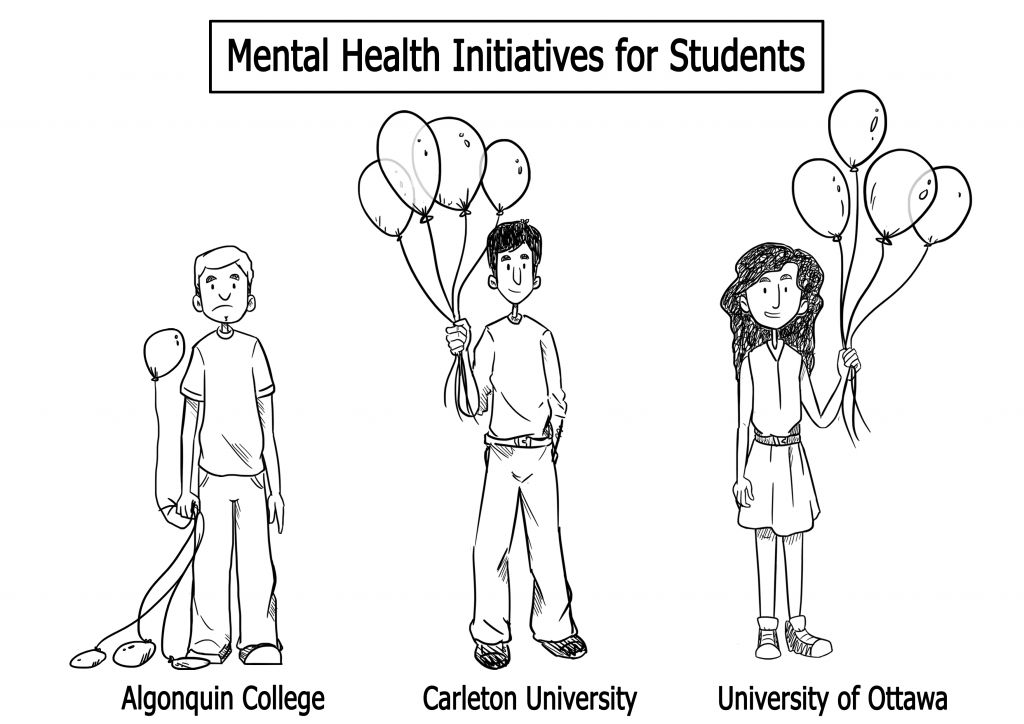Mental health issues are a crisis facing Ontario campuses and Algonquin is falling behind in combating the problem compared to other campuses.
When over 65 per cent of Ontario post-secondary students report having overwhelming anxiety, 46 per cent report feeling too depressed to function and 42 per cent say stress has negatively impacted their studies, preventative actions must be taken.
These numbers are shockingly high and additional measures must be considered. Counselling, medication and psychiatrists can only help a fraction of those students. It is an epidemic that has begun to be recognized by colleges and universities.
But Algonquin is once again behind the rest on implementing new ideas to confront the problem.
Stress is a word you hear almost daily on campus. That stress contributes to mental health illness by amplifying already-existing anxiety and depression.Add in Saeasonal Affective Disorder (SAD), worry over student debt, home life, and it’s little wonder we now have what one Algonquin mental health practitioner calls a “crisis.”
What to do? According to the Canadian Mental Health Association, physical activity and exercise is a great way to help relieve stress.
Unfortunately for students at Algonquin, gaining access to the Fitness Zone will add more stress to your finances by requiring a minimum payment of $130 for four months for membership on top of your tuition. uOttawa and Carleton University both offer access to their state-of-the-art gyms, pools, squash courts and more for all enrolled full-time students as part of their tuition.
No extra fee required.
Humber College in Toronto offers free use of their extensive gym facilities. St. Lawrence College in Kingston does the same and throws in a free 30-minute personal training session a month too. Algonquin has a $250.50 per term activity/sports fee everyone must pay, but there is still no gym or even aerobics class access.
Having that barrier of entry via the additional fee is detrimental to the health of the greater student body. Not every student can afford that, but if it was included in tuition almost every student would at least give it a shot.
That makes a healthy living choice to improve mental and physical health much easier.
That is not the only initiative Algonquin is falling behind on related to mental health. Fall reading week has been adopted by 15 out of 24 colleges across Ontario and 17 out of 19 universities.
That is roughly 75 per cent of all Ontario post-secondary schools.
Fall reading week has become a popular way of helping reduce stress and anxiety by giving students extra time to catch up on their studies — much like the winter reading week we all know and love.
Algonquin is once again slow to adapt and is now the largest college in the province without the fall reading week.
Students must realize that adopting a fall reading week will come with sacrifice. When a week of classes is taken out of the semester, it must be placed somewhere else. Many colleges and universities which practice the fall reading week place it at the start or end of the semester, cutting into the winter break or shortening the summer.
Regardless, schools that have made the change have the full support of the students.
Algonquin has a bad habit of falling behind on the times. We were behind in getting the uPass and we are once again staring at the greener grass at other campuses. With that said, we have wonderful staff in Health Services, at the Centre for Accessible Learning, inside your Academic Advisor’s office and with Counselling Services who all work extremely hard to help you manage your studies.
With the increasing cases of mental health issues in Ontario and across the country, it is long overdue for Algonquin to take steps in improving the quality and stability of student’s mental and academic lives.
Nobody wants to cross the finish line last and Algonquin is tripping on its way there.


